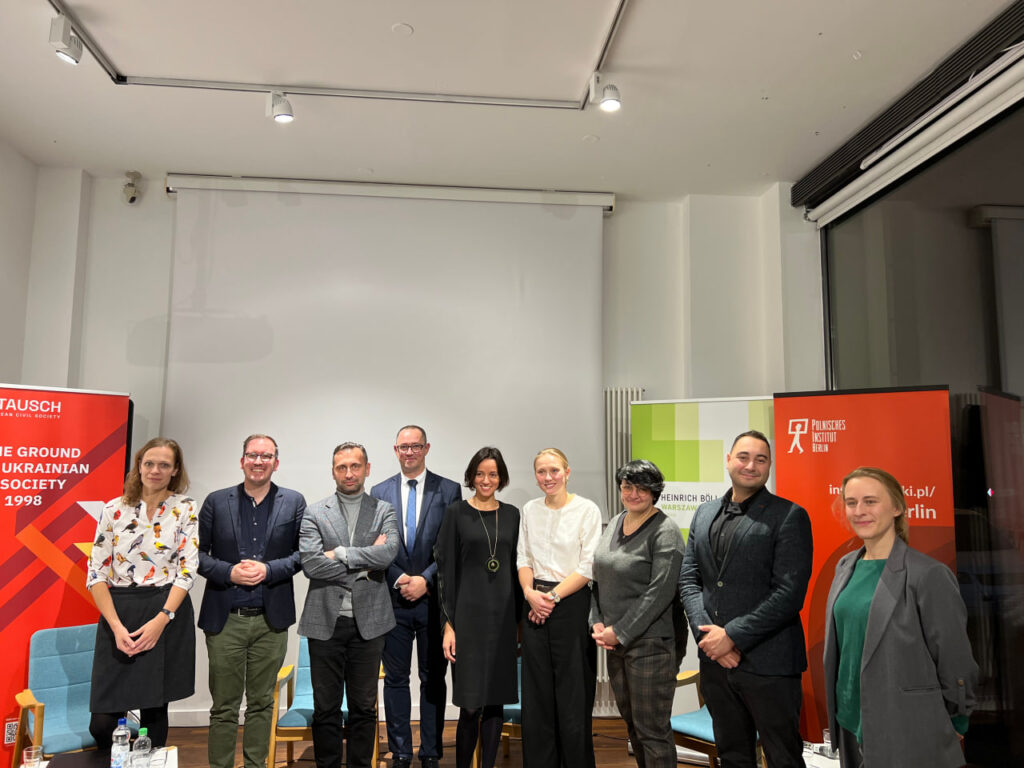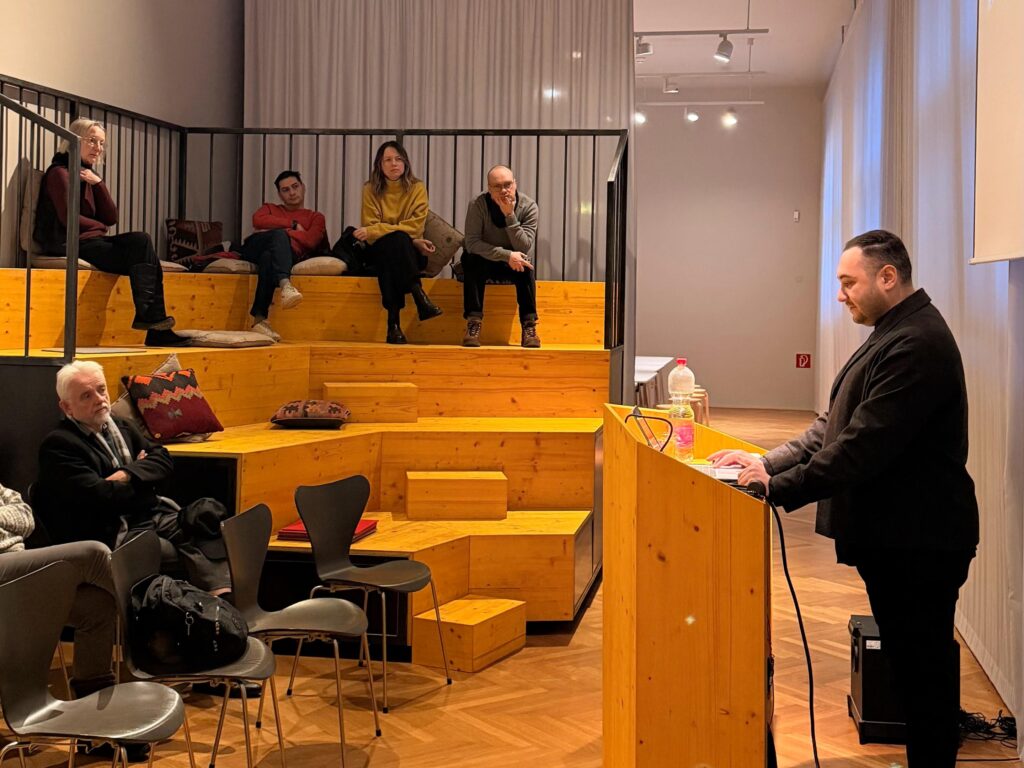Green Transformation in Germany, Poland, and Ukraine Amid the War and Post-War Reconstruction
Yesterday, we had an insightful and thought-provoking debate with Szymon Kardaś, Henriette Weser, Anastasia Bondarenko about “Green Transformation in Germany, Poland, and Ukraine Amid the War and Post-War Reconstruction”. The discussion focused on how the ongoing war in Ukraine is reshaping energy strategies and green initiatives across the region, and what this means for post-war reconstruction efforts.
Julia Kahrl, Deputy head of the Department of Energy Foreign Policy at the German Ministry of Foreign Affairs, also delivered a keynote speech. In her speech, Mrs. Kahri emphasized the importance of supporting Ukraine in all directions, including in the field of green transformation: “Germany and its partners today are doing everything to provide Ukraine with all the necessary resources for its further economic recovery. “
Energy Security and the Green Transition
One of the key themes of the debate was the urgent need for energy security in light of the war in Ukraine. Both Germany and Poland, traditionally reliant on Russian gas, have been accelerating efforts to diversify their energy sources. For Germany, this means doubling down on its Energiewende, the shift towards renewable energy, while Poland is also making strides in renewable energy development, particularly in wind and solar power.
Jacob Riemer, Second Director Austasch e.V., in his speech, emphasized the importance of maintaining a dialogue about green transformation in the difficult time of war: “We find ourselves at a pivotal moment, as recent polls indicate a declining support for military aid to Ukraine in German society. It is therefore essential to continue our discussion on the key factors influencing this situation. Among these, the green transformation and its implications for both Ukrainian and European security stand out as a critical yet often underestimated dimension.”
Ukraine, whose energy infrastructure has been heavily damaged by the war, is now more determined than ever to embrace sustainable energy. The country faces immense challenges but also unprecedented opportunities to rebuild its energy grid with a focus on renewables. This transformation is not only about reducing dependence on fossil fuels but also ensuring long-term energy security for a region grappling with instability.
The War’s Impact on Green Initiatives
The war has had a devastating impact on Ukraine’s energy system, with power plants and other critical infrastructure targeted by Russian attacks. However, panelists highlighted that this also presents a unique opportunity to rebuild in a greener, more sustainable way. As Ukraine looks to recover from the conflict, integrating green technologies into its reconstruction efforts could position it as a regional leader in clean energy innovation.
Henriette Weser, energy and climate policy analyst, Berlin Economics, raised the issue of energy sabotage from Russia to Ukraine even before the war: “Russia wants to use energy sabotage to influence both Germany and the EU in Ukraine, but now this issue decided with the support of America and Norwegian partners significantly solved the problem. In addition, Ms. Weser made an important prediction: “Today, European countries, and especially Germany, should support and strengthen Ukraine if Ukraine joins the EU and NATO.”
Cross-Border Collaboration for a Sustainable Future
The debate emphasized the importance of cross-border cooperation in driving green transformation. Germany’s advanced renewable technologies and Poland’s strategic role as a regional hub are both crucial in supporting Ukraine’s green transition. Panelists discussed the need for coordinated policies, financial investments, and knowledge-sharing to ensure the success of these initiatives. In particular, the European Union’s Green Deal and other international funding mechanisms were highlighted as critical sources of support for Ukraine’s post-war reconstruction. These frameworks not only aim to help Ukraine rebuild but also align with broader European climate goals.
Green Reconstruction: A Vision for Ukraine’s Future
A central point of the debate was the idea that Ukraine’s post-war reconstruction must prioritize sustainability. As the country looks to rebuild cities, infrastructure, and its energy grid, there is a strong push to integrate green technologies from the ground up. This includes building eco-friendly housing, developing renewable energy capacity, and implementing circular economy principles that reduce waste and emissions. The long-term goal is for Ukraine to emerge from the war with a more sustainable, resilient economy, capable of meeting its energy needs while contributing to the fight against climate change.
Anastasila Bondarenko, expert on ecology, Kyiv, head of the program “Climate and Environment” Exchange e.V. In her speech, Mrs. Bondarenko touched on the problem of demining Ukrainian territories: “The problem of landmines is key to the recovery of Ukraine.” She also asked the question: “What resources does Ukraine need in the face of a security threat?” For example, Chernihiv region is attacked every day, and building something new there in the field of nuclear energy is a difficult issue. However, we are doing our best today. We have a critical situation with decarbonization. We have a huge list of tasks, priorities have changed. In fact, the Azovsta plant was destroyed – it was a very polluted place. This is an opportunity for us to transform the economy towards a greener agenda”.
Challenges and Opportunities Ahead
While there is strong momentum for green transformation, panelists acknowledged the challenges ahead. Financial constraints, political uncertainties, and the immediate demands of the war present significant obstacles to fully realizing the potential of green reconstruction. However, there is also optimism, driven by the growing commitment from governments, international organizations, and civil society. As Germany, Poland, and Ukraine navigate these challenges, the focus remains on aligning short-term recovery with long-term sustainability. The debate underscored the importance of bold action and regional cooperation in ensuring that the post-war reconstruction effort not only addresses immediate needs but also lays the groundwork for a greener, more resilient future.
Many thanks to Kolegium Europy Wschodniej, Heinrich-Böll-Stiftung Büro Warschau, and Polnisches Institut Berlin for organizing such an impactful event!





